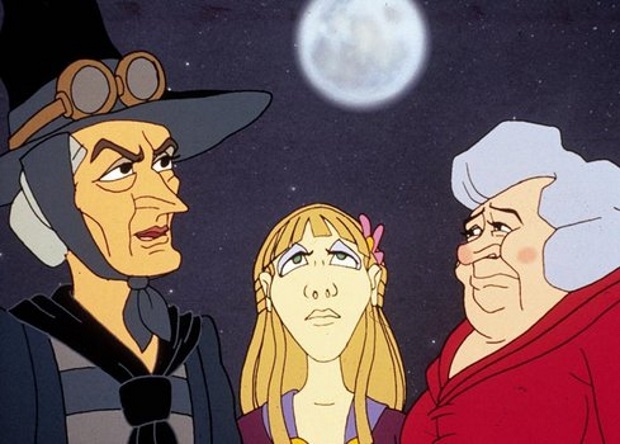The Animated Discworld Adaptations You May Have Forgotten
The studio behind Danger Mouse and Count Duckula also gave us some less well known takes on Terry Pratchett's Discworld universe
This article comes from Den of Geek UK.
There have been a number of attempts to bring Terry Pratchett’s Discworld to the screen over the years, two of which have – so far – actually managed to make it to air. The better known is probably Sky’s live-action dramas, which aired during holiday seasons between 2006 and 2010 and adapted Hogfather, The Colour Of Magic/The Light Fantastic (as one mini-series under the title The Colour Of Magic) and Going Postal. Less well known, however, are Cosgrove Hall’s 1997 animated adaptations of two Discworld novels: Soul Music and Wyrd Sisters.
Cosgrove Hall had previously done an animated adaptation of Pratchett’s Truckers, an earlier children’s novel unconnected to the Discworld series, in 1992. The animation studio, which was in business 1976-2009, was best known for children’s programming, including beloved favourites Danger Mouse and Count Duckula. Soul Music and Wyrd Sisters, however, did not alter any of the more ‘grown-up’ aspects of their stories (such as questions of paternity, or drinking alcohol to forget) but presented remarkably faithful adaptations of their source texts.
There are many elements to the world of the Disc – fantasy and fantastical characters and landscapes, fully realised and three-dimensional characters (once you get past the first couple of novels), high drama and action-packed climactic sequences. Most importantly of all, though, these novels are, first and foremost, comedies. They are dramatic and moving and many other things, but it is absolutely essential that they are funny.
One of the things these adaptations get really right is the comedy. The six-part stories (six 22-minute episodes) are fast-paced and preserve many of the jokes from the original books. The series also enhanced jokes from the books with appropriate on-screen interpretations – for example the solemn chanting of the Fools’ Guild in Wyrd Sisters, which sounds like medieval monks, is especially inspired.

You can see this in the casting, which represents the cream of British comedy crop in the mid-1990s – Wyrd Sisters stars two Absolutely Fabulous alumni (Jane Horrocks and June Whitfield) with Annette Crosbie, of One Foot In The Grave fame, as Granny Weatherwax. Soul Music features Graham Crowden, from Waiting For God, and Neil Morrissey, from Men Behaving Badly. The series’ biggest casting coup, though, was an absolutely perfect bit of casting – Christopher Lee as Death. Lee later voiced Death for Sky, after their first Death, Ian Richardson, passed away himself, but Lee was Cosgrove Hall’s first choice, and a more perfect match of voice and character is difficult to imagine.
The studio made a solid choice of stories for their two stand-alone productions. Wyrd Sisters is perfect for an independent Discworld story. While Granny Weatherwax had appeared in an earlier novel (Equal Rites), Wyrd Sisters is the story that introduces the Lancre coven of Weatherwax, Nanny Ogg, and Magrat Garlick, so it requires no prior knowledge for the story to work. The plot riffs on Shakespeare’s Macbeth, so it’s a great entry point for Discworld novices, as the familiar elements of the story can help people get into this fantastical world of witches, ghosts and anthropomorphic personifications.
Soul Music is a more surprising choice, as it’s a direct sequel to an earlier novel, Mort. However, it works well enough – you don’t really need the backstory of Mort for the story to be understandable, though of course it does spoil the plot of its predecessor (including a re-creation of the climax of that story). It’s interesting that both TV adaptations of Discworld novels have chosen stories starring Death’s grand-daughter, Susan Sto Helit. Presumably the universality of the abstract concept of Death, combined with Susan’s deadpan delivery, has both visual and comic appeal to adaptors. It’s odd that no one has yet started with Mort, but perhaps the timeline complications that might introduce for future adaptations (it involves the kingdom of Lancre missing out on 15 years of the outside world’s time in Wyrd Sisters, during which Susan Sto Helit grows from a baby to a teenager) put them off!

These series are products of the 1990s, so they’re a great opportunity to indulge in some nostalgia. 90s computer graphics! Cheesy electronic muzak for the opening sequence! Bouncy cartoon background music for the funny bits! Some of the sound effects even sound exactly like some of the sound effects on Red Dwarf, which is a bit distracting, to be fair.
Of course, these productions are not perfect. The action has that stilted feel of not-high-budget animation. Most of the use of accents reflects the implied accents of the books very well (Soul Music’s Imp Y Celyn – or ‘Bud of the Holly’ – is Welsh, for example) but Wyrd Sisters’ The Fool is specifically supposed to come from Lancre, and yet has a completely different accent from the local witches. And there are the issues associated with any TV adaptation – for many viewers who have read the books, these may not reflect quite what they had in mind, as nothing will ever entirely reflect what someone sees and hears in their own imagination.
There are always rumors circulating of new Discworld adaptations, announcements of new Discworld adaptations and requests for new Discworld adaptations – the latest being the BBC’s planned CSI Discworld-style series The Watch. We do know that the BBC’s adaptation of Pratchett’s non-Discworld co-authored novel with Neil Gaiman, Good Omens, will be coming out next year. I think these cartoons prove that a funny, effective, entertaining adaptation of a Discworld novel is far from impossible – fingers crossed we get another one soon!
Read the latest Den of Geek Special Edition Magazine Here!
